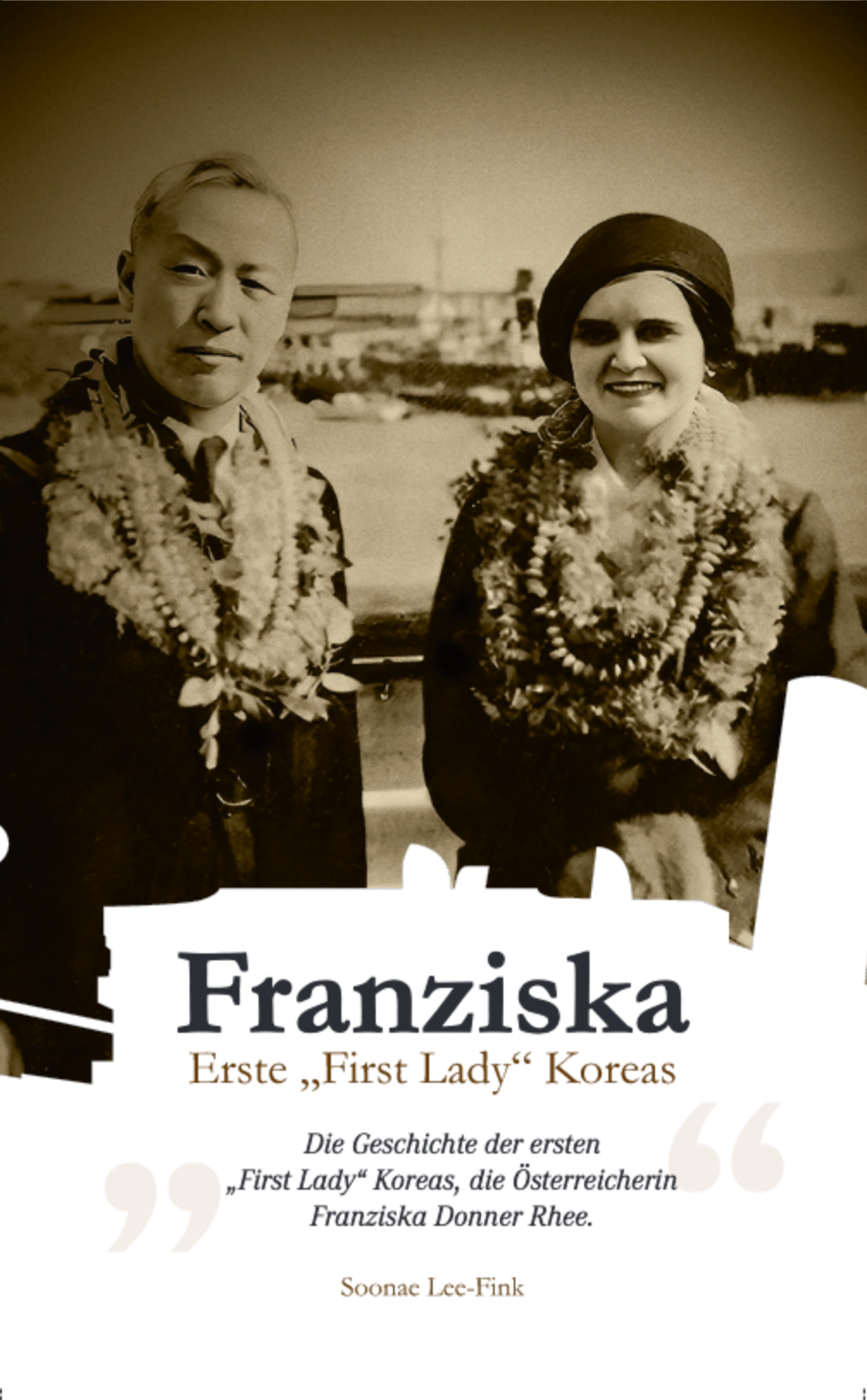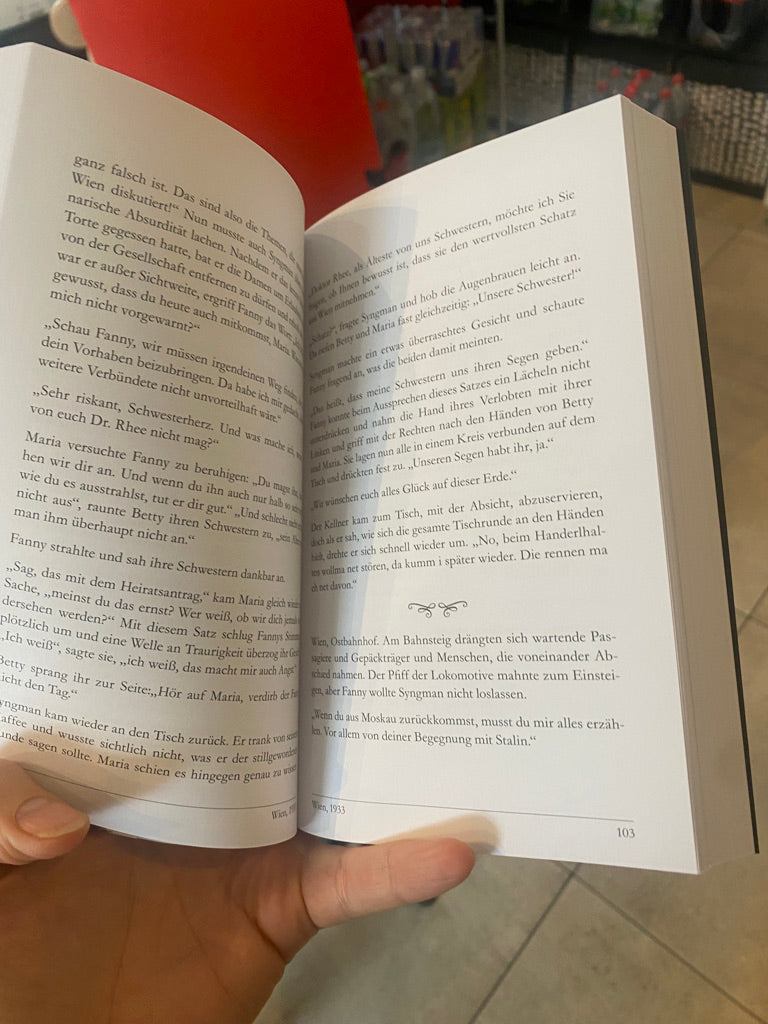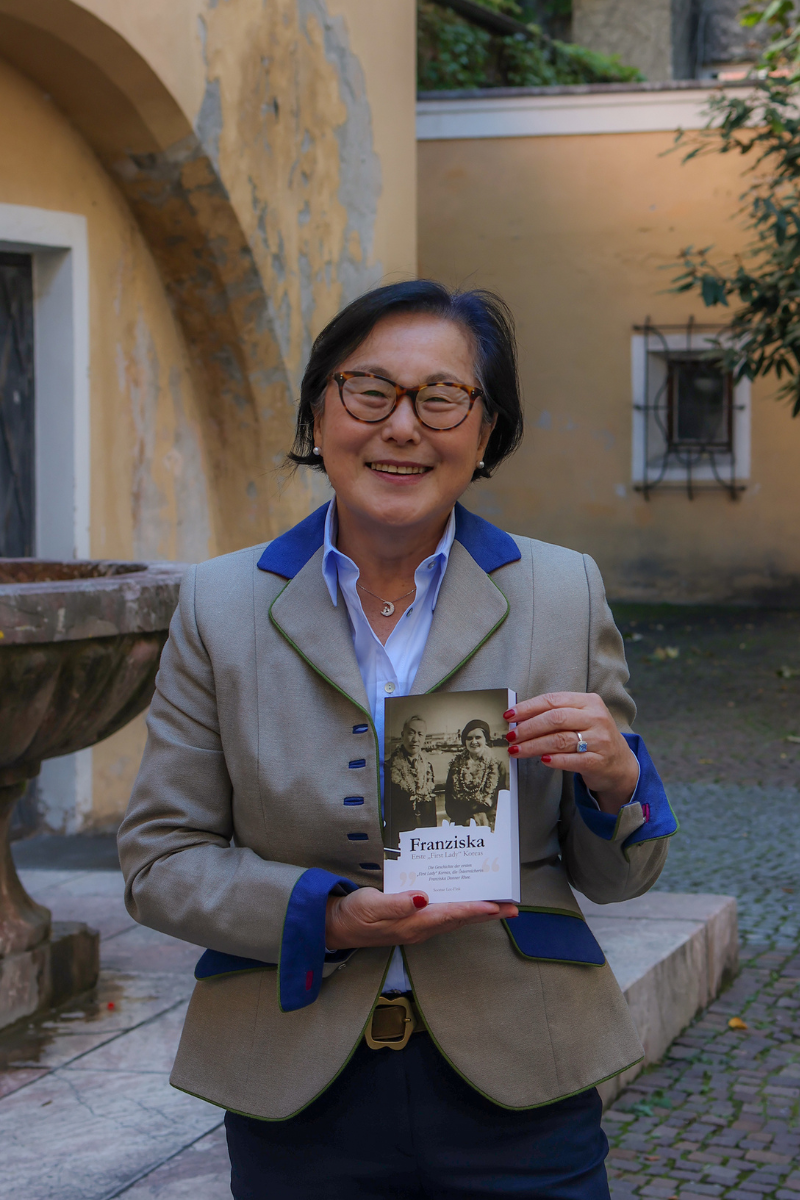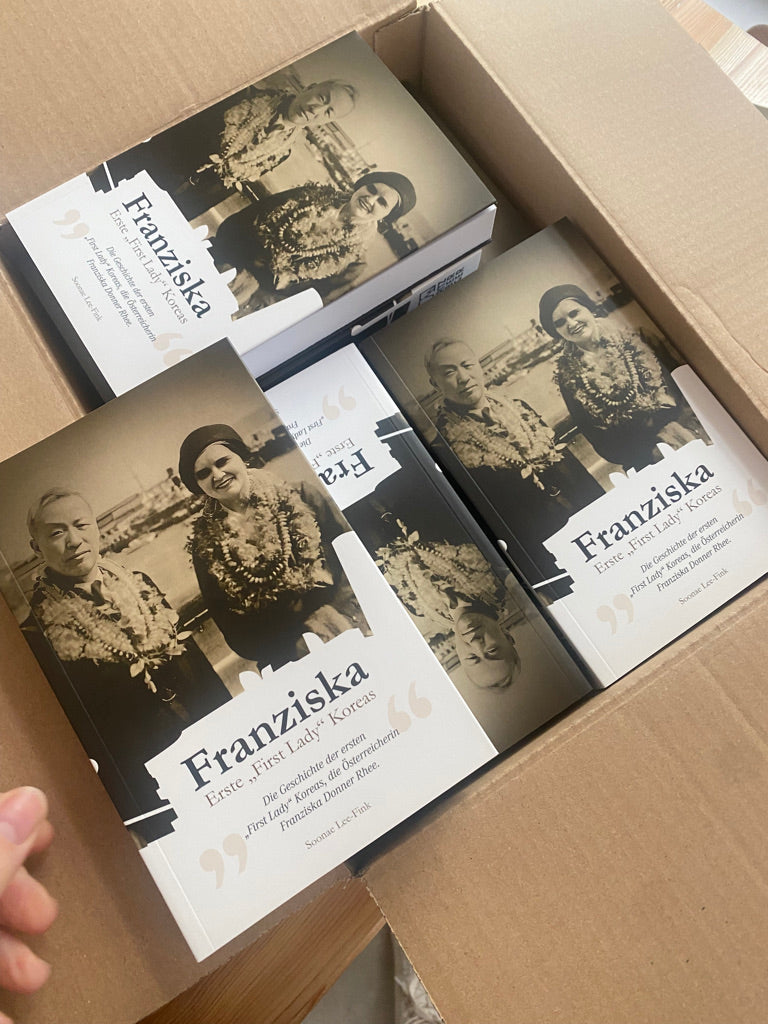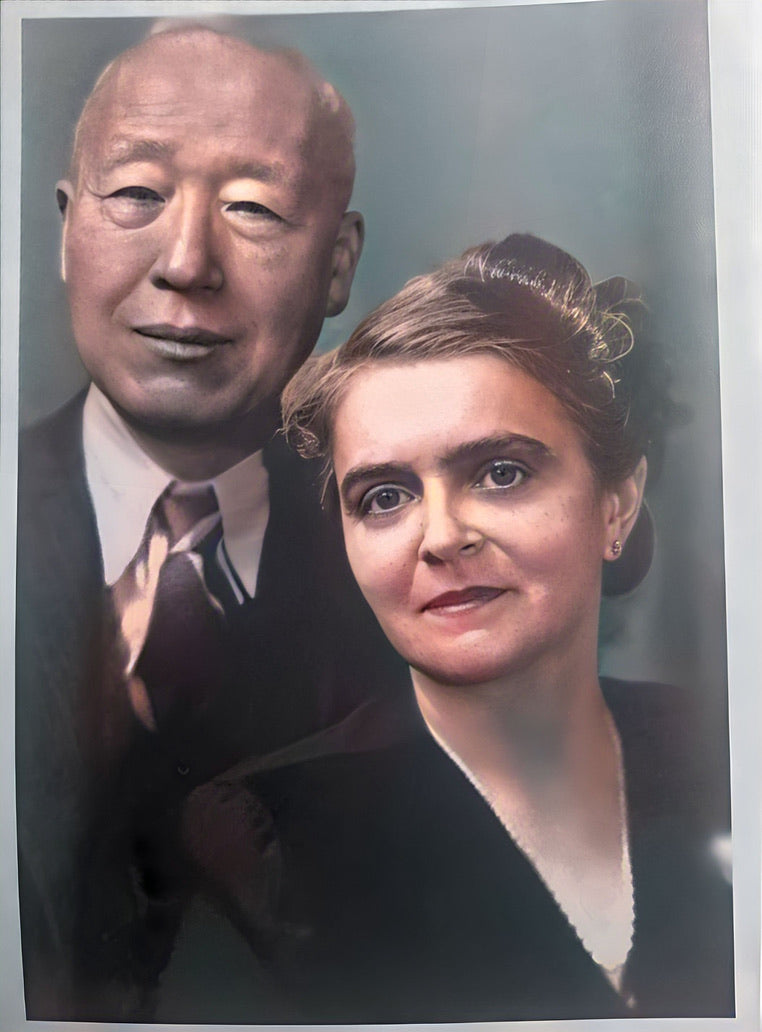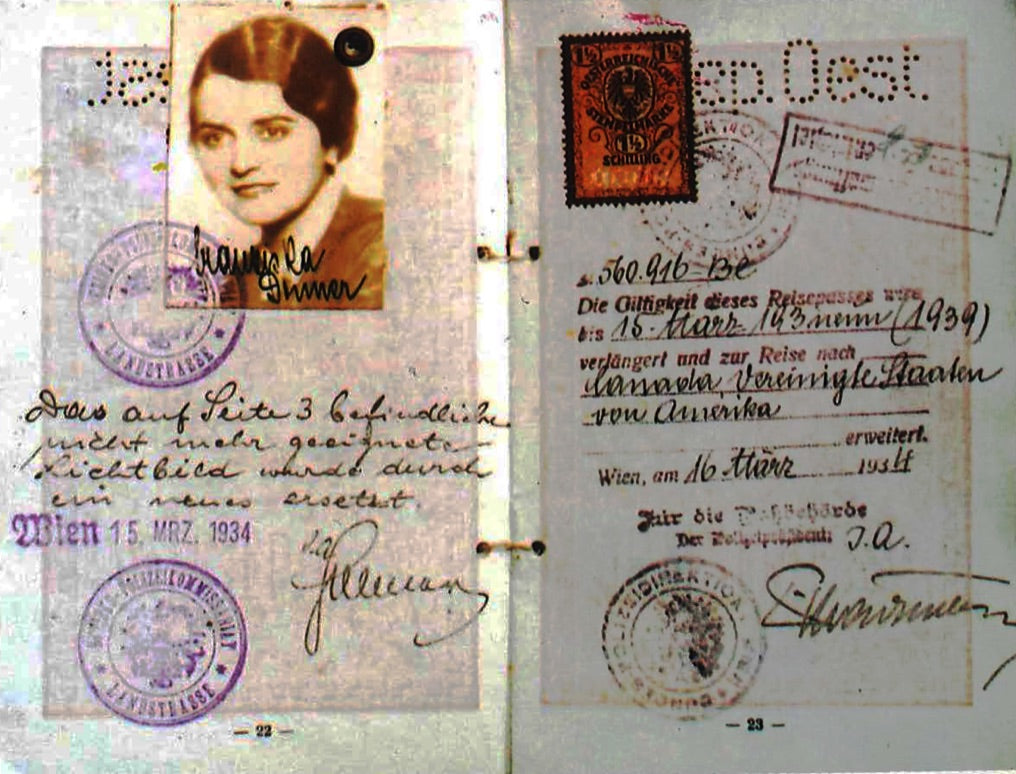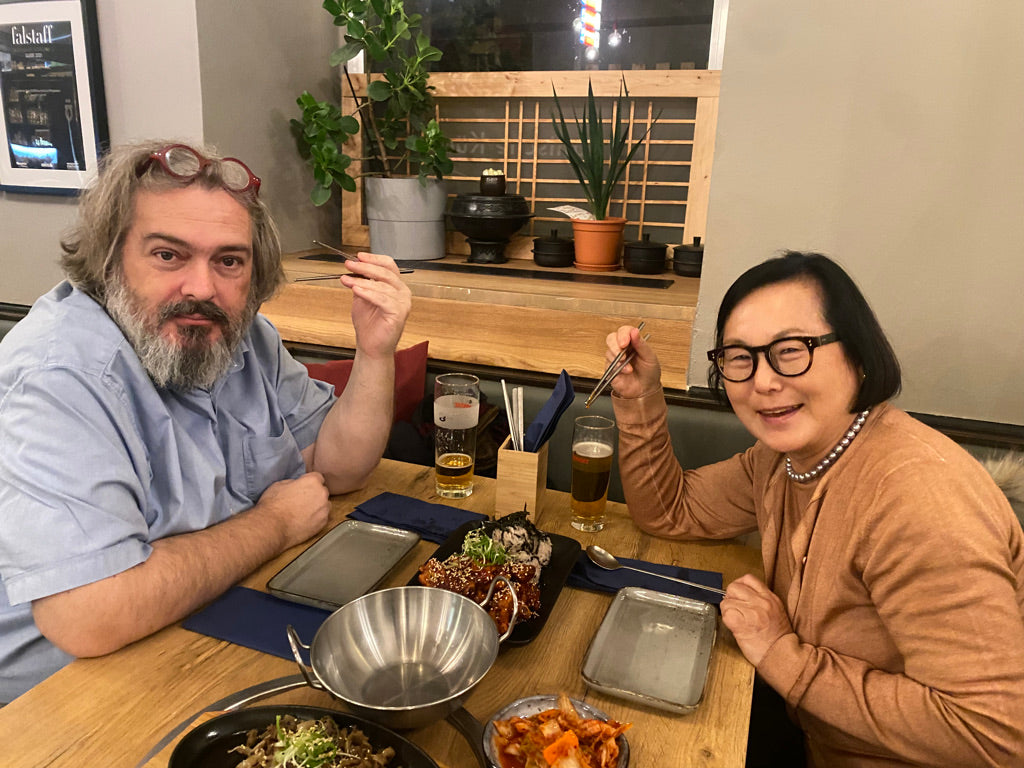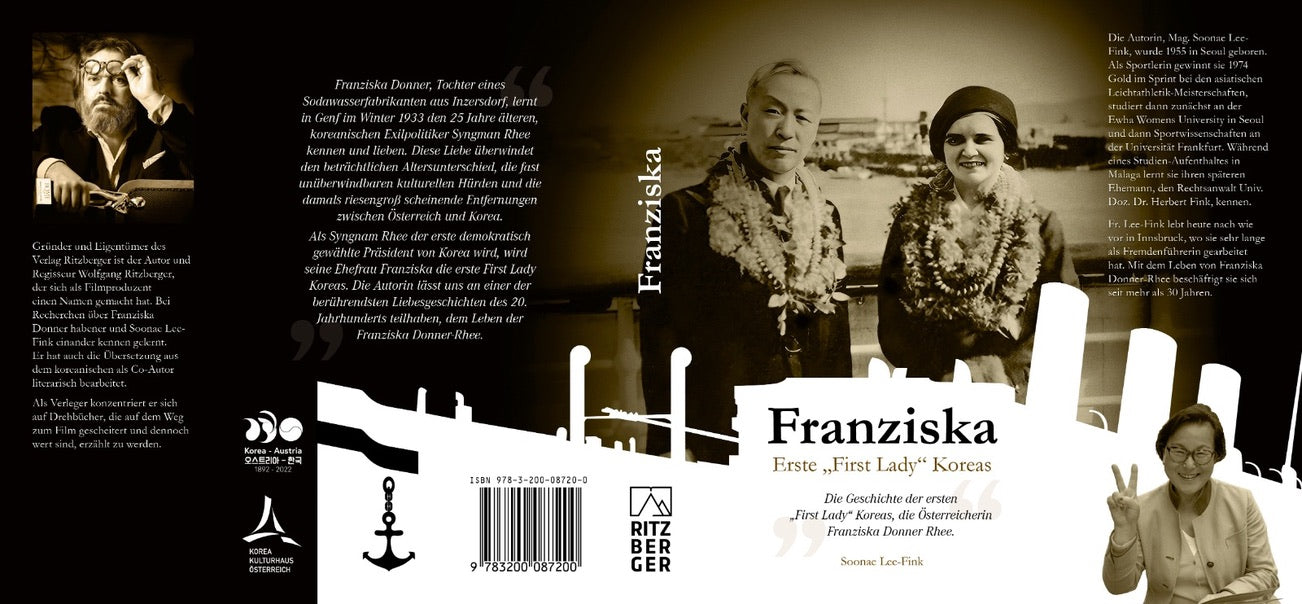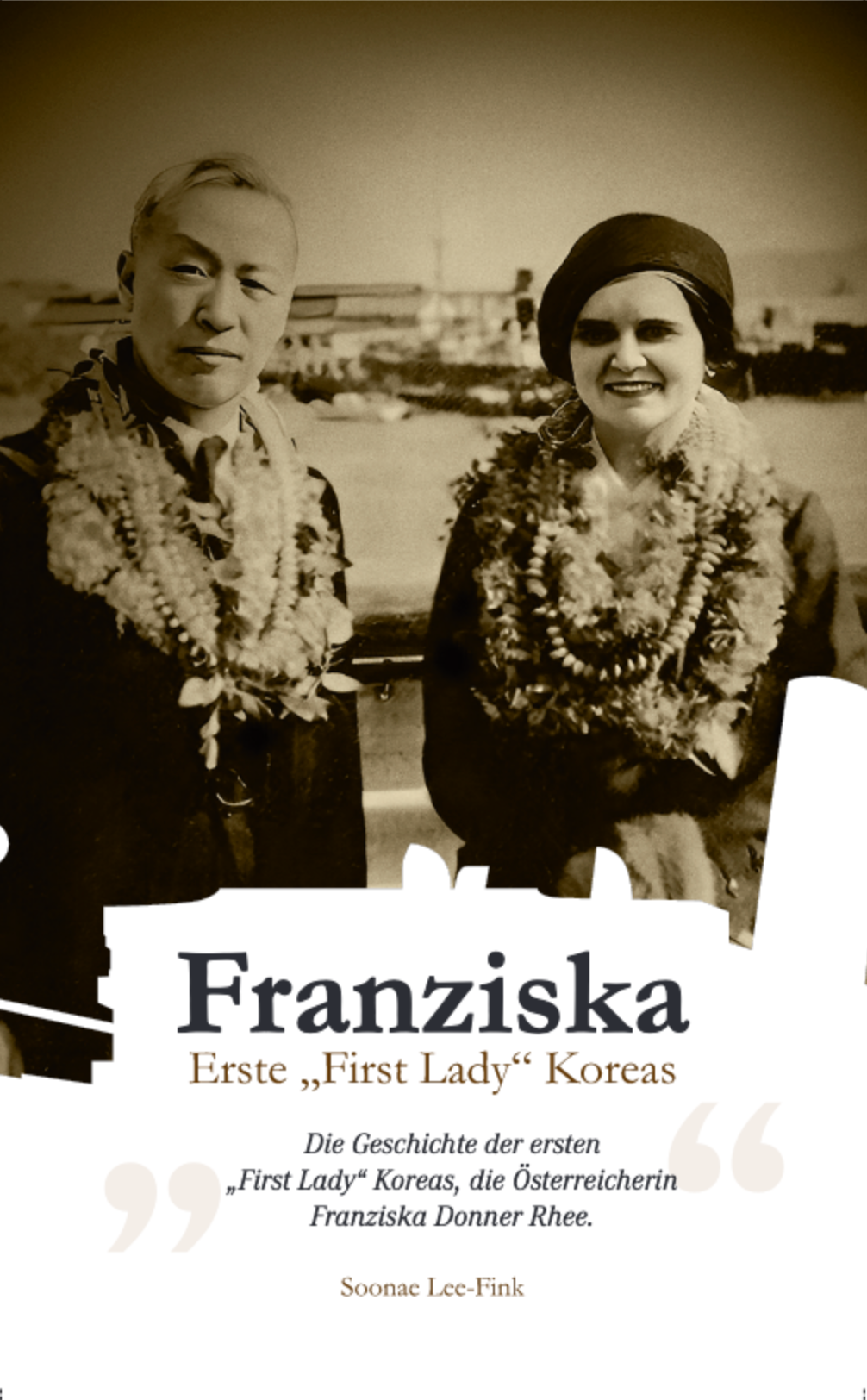
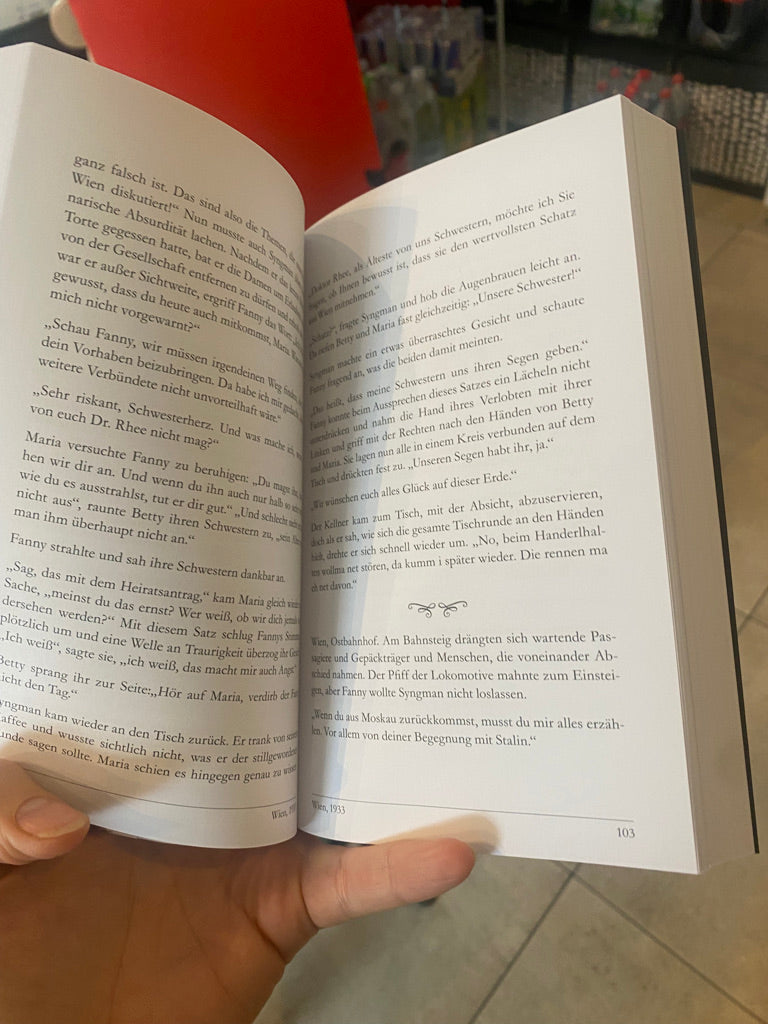
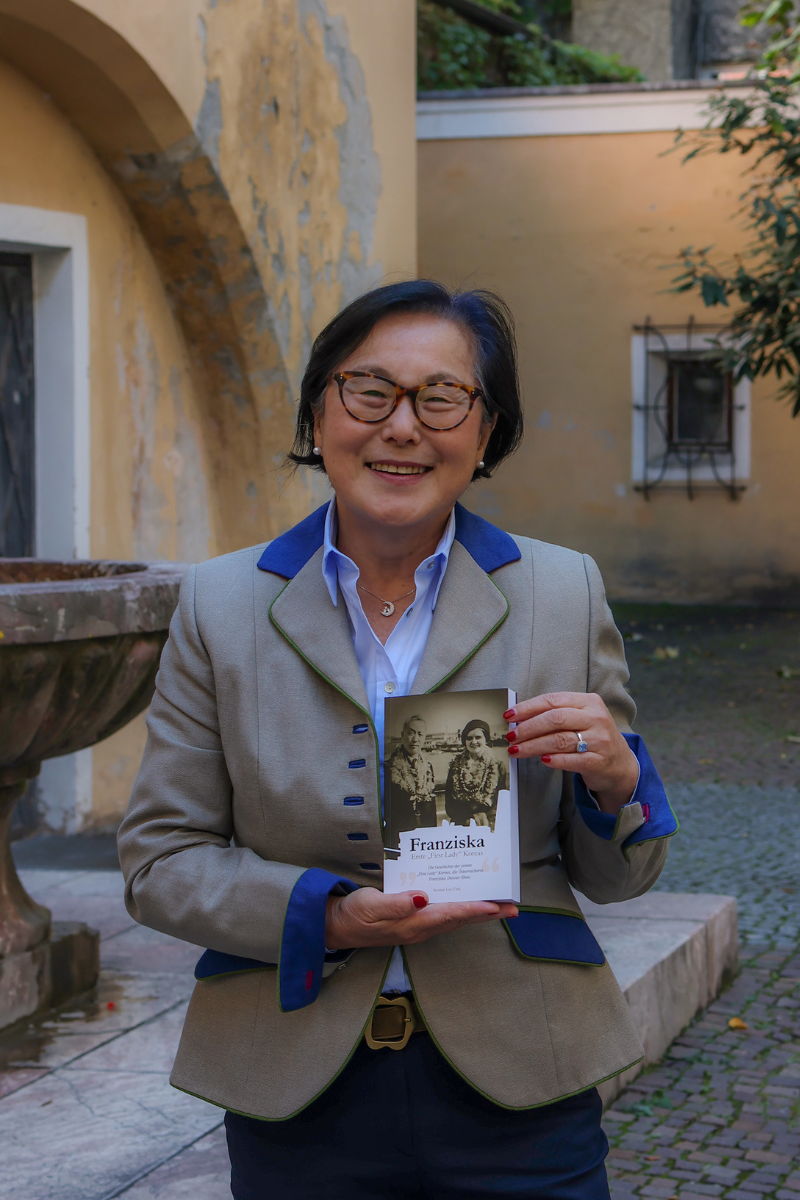
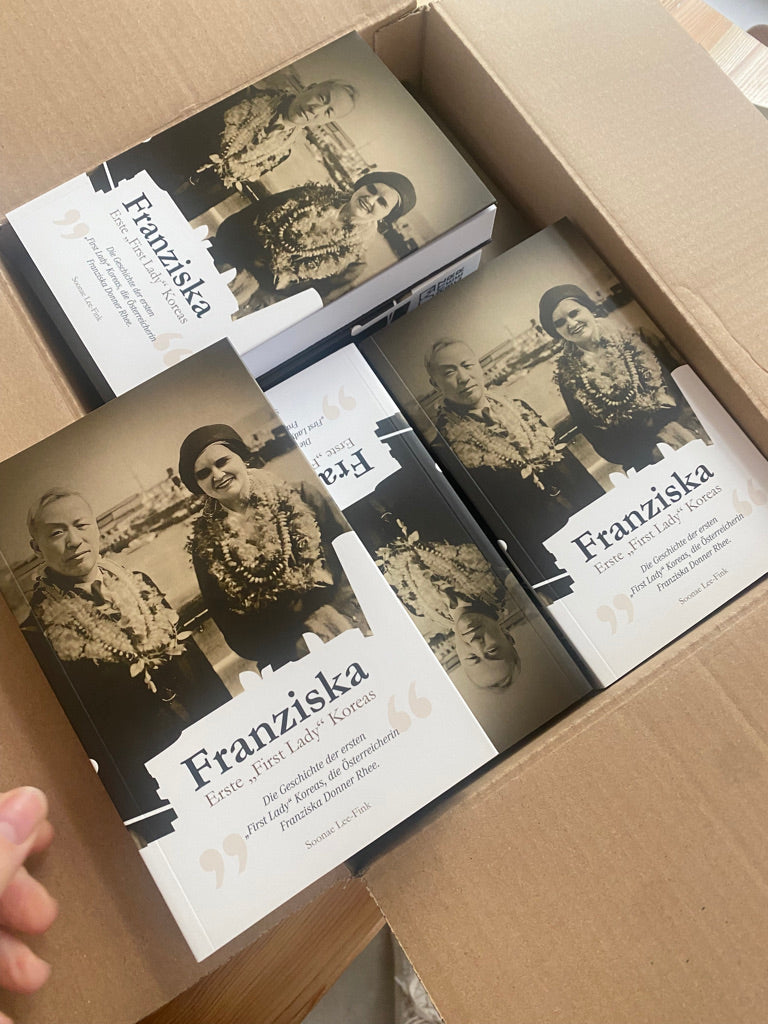
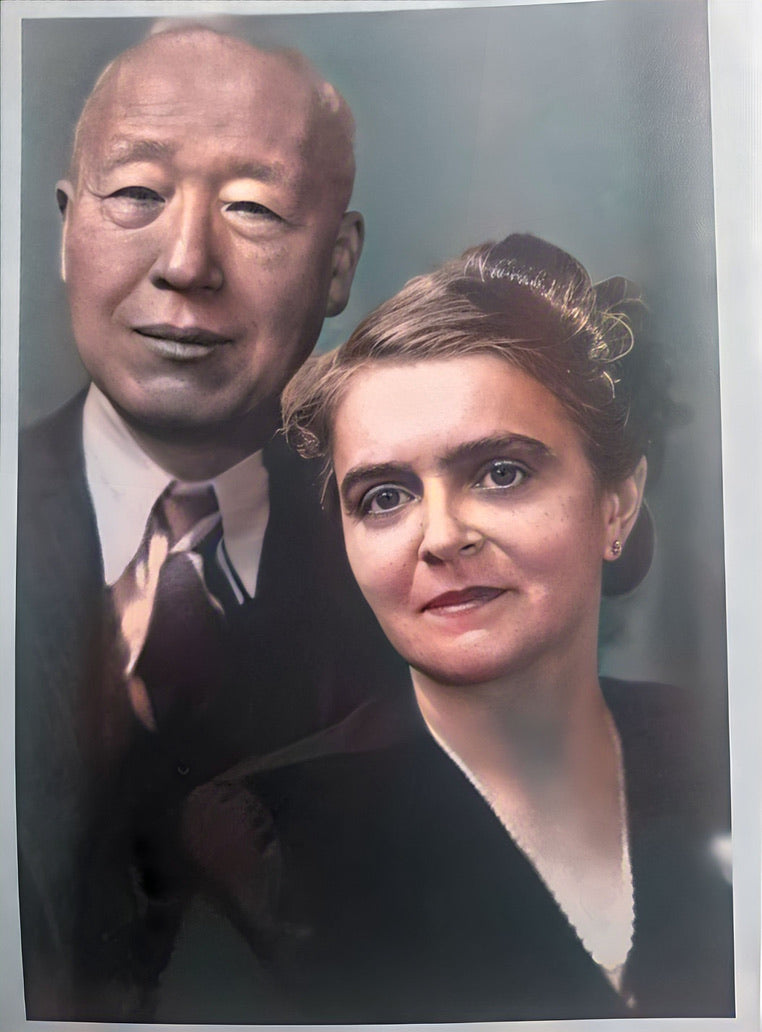
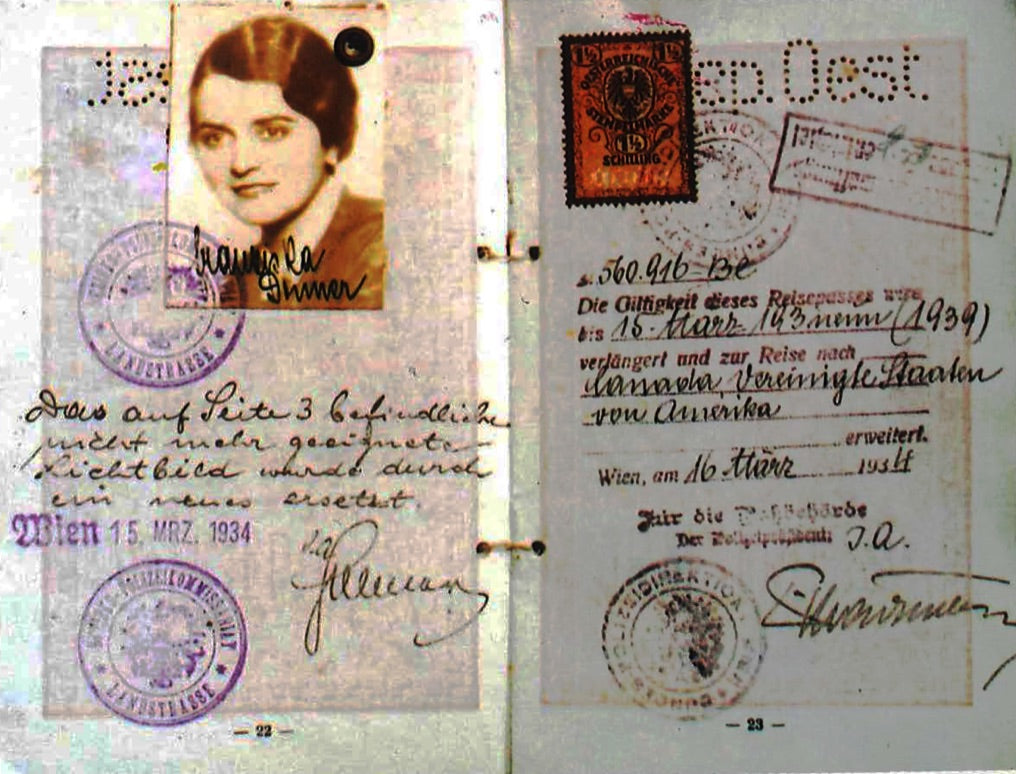
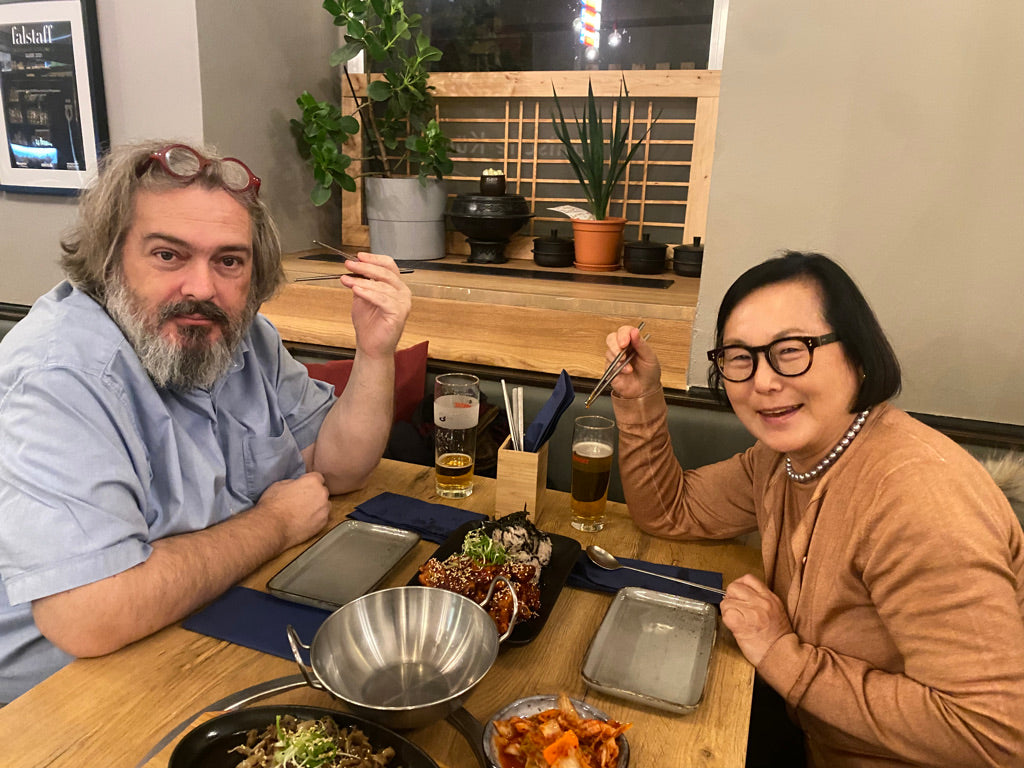
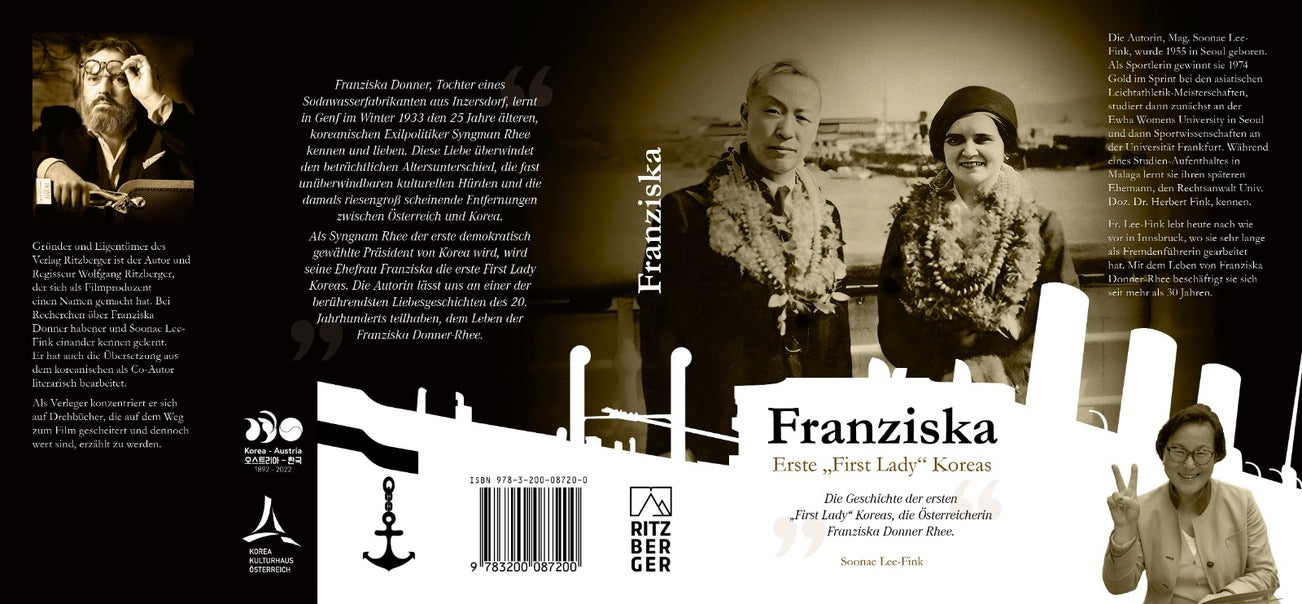
Collapsible content
Table of Contents
- Foreword author
- prolog
- Innsbruck, 1990
I. Only with love
II. The long wait
III. i love korea
epilogue
Innsbruck, 1992
Foreword author
The love for my husband, whom I met in Malaga, once led me to Austria, where I still live today after the death of my husband. Franziska Donner's love for her husband, whom she met in Geneva, also took her abroad, in her case to Korea. There she died at the age of 92 surrounded by her new Korean family, almost 30 years after the death of her husband.
It always seemed to me to be a coincidence of fate that the story of an Austrian woman living in Korea should become an affair of the heart for a Korean woman living in Austria. The life of Franziska Donner is the touching story of a great love between two people who come from very different cultures and yet, despite all difficulties, loved each other dearly.
The fact that Franziska would become Korea's first First Lady as Francesca Donner-Rhee alongside her husband Syngman Rhee was not something she was born with. When they met in Geneva in the 1930s, Rhee's election as Korea's first president seemed unlikely, even after the departure of Japanese troops. Nonetheless, for decades Syngman Rhee had an unshakable belief that his native Korea would one day be free again.
The history of Korea and the sometimes difficult to understand politics of different parties and interest groups are not the subject of this book. Almost 30 years after her death and half a century after Syngman Rhee died in exile at her side, Franziska Donner's life and love for her husband continues to inspire me. This book is about her.
She literally gave up everything to follow her love and gave up a secure existence to be with her husband. As First Lady, Franziska influenced the strict etiquette of Korean society with her own style, which among other things meant that Rhee was often ridiculed by his opponents because he obviously listened to his wife. For Korea in the 1940s and 1950s, this was almost a revolution. Franziska's only concern was her husband, whom she wanted to accompany safely through life, which she did with dedication until his death in exile. After that she was looking for a new life for a few years, spent a short time in Austria, but ultimately only found a home in Korea with her Korean family, where she spent the last two decades of her life as a Korean. Together with their adopted son and his wife, they tried to cherish the memory of Syngman Rhee, which was not always easy for them. Syngman Rhee is rarely given pride of place in Korean history. He was seen as a dictator and his reign as one characterized by corruption, and in my opinion he is wrong to make such an assessment. It is probably thanks to Rhee that a free, democratic South Korea exists today. It is thanks to his persistence that Korea was spared the fate of Vietnam. With his views, he very often sat symbolically between all stools, between the rival political currents in Korea and the geopolitical interests of other states.
In my book we get to know the private side of the politician Syngman Rhee, that of a loving man who, like Franziska, had to cross cultural borders in order to be fair to the love of his life. She set up a museum for him in her former home in Seoul and gained respect and recognition for her traditional and humble life as a widow from a Korean point of view.
My wish is, on the one hand, to erect a small memorial to this extraordinary woman with this book and thereby help ensure that she is not forgotten, and on the other hand, by describing her story, to create the connection between my old and my new homeland, between Korea and Austria, to clarify.
My book is a novel based on the historical figure of Franziska Donner. The diaries she kept fell victim to water damage in her home in Seoul after her death and are irretrievably lost. As a result, there are no documents or witnesses to a number of periods in her life, which is why I have added some fictional details in the name of literary freedom. The dialogues, in the form in which I describe them in this book, also arise from my imagination of individual scenes from the life of Franziska Donner. During my research I had to discover that there are only a few documents about Franziska. Her Austrian family, whose members now live in Austria, the USA and Canada, were also not interested in a story about Franziska, and some even refused any contact. This is regrettable, among other things, because Franziska and her sister used to correspond extensively for years. This correspondence and the reason why the family stops all contact remain a mystery to me for the time being.
For these reasons, the book cannot be viewed as a biography, or what we now understand it to be, but as a personal telling of the story of a very strong woman alongside a very strong man and their love for one another. I wrote this story the way I write my diaries. The story of Frances ca "Franziska" Donner-Rhee, the first First Lady of Korea.
Soonae Lee Fink, October 2022
PS: The book was published in Korea several years ago and has aroused great interest among the historically interested public. I did the long overdue translation into German shortly before the outbreak of the corona pandemic. In the meantime I had met the film producer and author Wolfgang Ritzberger, who wanted to write a screenplay about Franziska Donner. Together we decided to revise the translation from a literary point of view in order to be able to publish the book in German.
I am particularly pleased that we were able to win the Korea Kulturhaus Austria in Vienna as the publisher of this book and that it will be published with the support of the Ambassador of the Republic of Korea in October 2022 on the occasion of the 130th anniversary of the establishment of diplomatic relations between Korea and Austria could be presented.
The book is a contribution to the deepening of cultural contacts between the two countries and a memory of Franziska Donner, who added a very personal note to this relationship through her historical work and her life.
The author / info
The author, Mag. Soonae Lee-Fink, was born in Seoul in 1955. As an athlete, she won gold in the sprint at the Asian Athletics Championships in 1974, then studied first at the Ewha Women's University in Seoul and then at the University of Frankfurt. During a study stay in Malaga she met her future husband, the lawyer Univ. Dr. Herbert Fink.
Soonae Lee-Fink still lives in Innsbruck, where she worked as a tourist guide for a long time. She has been dealing with the life of Franziska Donner-Rhee for more than 30 years.
book info
Title: "Francisca"
Subtitle I: "the first First Lady of Korea"
Subtitle II: The story of Korea's first "First Lady", the Austrian Franziska Donner-Rhee
ISBN: 978-3-200-08720-0
Paperback, softcover binding, 352 pages with numerous photos
Author: Soonae-Lee Fink
Literary editing: Wolfgang Ritzberger
reading sample

Hotel de Russie, Geneva
It was at this hotel that Syngman and Franziska met.
Chapter I
only with love
Geneva, 1933
China, January 1: Combat against Japanese troops in Shanghai.
Switzerland, February 24: The League of Nations demands the withdrawal of Japanese troops from Manchuria.
USA, March 4: Theodore Roosevelt begins his first term as the 32nd President of the United States of America.
Geneva, March 27: Japan declares its withdrawal from the League of Nations.
------------------
The train to Zurich left Geneva at nine o'clock and was already in full swing. In a first class compartment sat two very well dressed women, a mother and her daughter, facing each other. Porcelain teacups decorated with the railway company's logo stood on the tables in the compartment. The two had apparently argued. The tension that was in the air was literally palpable. The daughter, herself a grown woman in her early 30s, looked silently out of the window and didn't look at her mother. Outside, the landscape of French Switzerland presented itself. Vineyards rolled by and the snow-capped mountains formed an impressive panorama in the background. At that moment, however, the young lady had no sense of the beauty of the landscape. As the train rattled around the mist-shrouded Lake Geneva in a sweeping curve towards the northern city of Zurich, she gazed melancholy out of the window. Now and then a tear ran down her cheeks. The cup of tea in front of her was still untouched.
Ms. Donner looked at her daughter with concern. Not only did she give her her own name - Franziska - after she was born, she also inherited a strong stubbornness. Franziska Donner already had a failed marriage behind her, but she just couldn't understand why her mother was always so worried about her, after all she was an adult. But mothers always want the best for their daughters. This was especially true for Mrs. Donner, who not only had to support the soda water factory after the death of her husband, but also three daughters. Irritations were not really welcome there.
This foreigner, whom they happened to meet in Geneva, seemed decent enough, but he was such an irritation. First, he was quite a bit older than Fanny, second, he was the president of Korea in exile, and third, he had no money. For heaven's sake, thought Frau Donner, what kind of future is this supposed to be? Nothing had happened yet, but as a mother she had a sixth sense. Her Fanny might not yet be aware of it, but she had the feeling that this stateless statesman had come dangerously close to his daughter. Suddenly she had only been talking about him, about Korea and the struggle for freedom in the small Asian country on the other side of the world. Frau Donner was certain that it had been the right thing to leave Geneva immediately. The only decision that made sense in this case. Frau Donner looked over at her daughter, who was still staring out the window, her face stony. “Time will work for us. The girl will have other thoughts,” she thought to herself.
"What's going on here today, Fanny? The restaurant is completely overcrowded. Who on earth is staying here that Kreti and Pleti are scrambling for places at dinner?” Ms. Donner was downright annoyed. The Hotel De Russie, located on the shores of Lake Geneva just off the Pont de Mont Blanc, was a posh and usually discreet five-star hotel. It was usually quiet in the hotel restaurant at this time of day and the few patrons who did come here for five o'clock tea tended not to make such a fuss. But today everything seemed different. Most of the tables were already occupied, and there was a lot of coming and going. Everywhere there was heated discussion and chatter, the waiters darted through the restaurant. There was no sign of the discreet charm that the hotel once exuded. Fortunately, a table was always reserved for the Donner ladies during their stay. The two sat down without being asked, as the chef de rang didn't have time to greet them and move their chairs around.
"Mom, you should read the newspaper. Then you would know that the League of Nations is meeting here in Geneva today. That is why diplomats and politicians have come from all over the world and are flooding the city.”
"Oh I see? The League of Nations you say, how interesting. And now they are all in our hotel of all places. There you go.” She unfolded the cloth napkin that lay artfully draped in front of her with a vigorous jerk and spoke to her daughter in a muffled voice: “And please don't call me mom, I'm your mother and not mom!”
Fanny only listened with one ear. She already knew her mother's statements by heart, who preferred to be addressed as "Mrs. Mama", with the emphasis on the second "a". Instead of listening to her mother, she studied the menu. "C'est exactement comme ça, Mademoiselle! If you are interested in politics, then Geneva is the right place for you today,” said a waiter who hurriedly approached the table, but when guests from the next table called him he immediately left again with a brief apology. Frau Donner murmured, more to herself than to anyone else that only Fanny could understand: "Yes, an interest in politics, as seems befitting of a young lady of rank these days. She reads everything in print, everything she can get her hands on. Newspapers, books, journals, everything.”
"Am I hearing criticism from my strict wife Mama?" "Criticism of your own daughter? Are you still allowed to do that these days…” Fanny interrupted her: “Mom, I'm not a little girl anymore, I'm…” Before she could finish speaking, the chef de rang, who seemed a little rushed, interrupted her : “Bonjour, Madame de Donner, have you had a chance to think about your order? Or may I recommend something to you today?" Ms. Donner raised an eyebrow slightly: "You could explain to me why a fair is taking place here today and we are not served with the attention for which this house crosses the borders of Switzerland known." "Mrs. Baroness, I am at least as dissatisfied as you are, but you and I did not invent the League of Nations. And to be honest, I don't even know if I need it at all. But management, and believe me it's the same in the other houses, is almost forced to take in all these people. I think we now even rent out the broom closets as single rooms. Of course, I would enjoy it infinitely more to chat with you about - forgive my bluntness - these terrible times, but...". Frau Donner, who had been listening to the restaurant manager, or, as they would say in Vienna, the head waiter, the whole time with an impassive expression, spoke in a low voice: "I forgive you for being addressed as a baroness, and I would even forgive me even quicker if you would be so kind as to bring me and my daughter two glasses of Chablis, the same as last night. Add to that this much-vaunted table water and the evening menu, just as it says on the menu, please.”
"Mom, I'd like a glass of Coca-Cola instead of the white wine?" "Oui, Mademoiselle, un Coca-Cola, très américain!"
Ms. Donner raised her eyebrow a little and said, "That's all, thanks."
"Of course, bottled water, Chablis, a glass of Coca-Cola and the dinner menu is coming immediately."
"Cola-Cola, or what's that stuff called?"
"Yes, Coca Cola. Comes from America and is now offered all over Europe! Very sophisticated.” While Mrs. Donner shook her head, Fanny curiously watched the goings-on in the overcrowded restaurant. There was truly an unusual crowd that day. She had read that the League of Nations, in its current reduced form, had moved to Geneva. Although most of the guests sitting here today were Europeans, she also spotted a few Arabs, Japanese, Africans and Indians sitting at their tables with colorful turbans on their heads. Fanny was particularly interested in an Asian who had just entered the restaurant. Though he wasn't particularly tall or young, she found him interesting. He had gray hair, wore a dark suit, and had the demeanor of a great statesman, which made it impossible not to notice him. Fanny found it difficult to take her eyes off him. The man looked around, obviously looking for something, probably for a seat. He spoke to the head waiter, who looked around the restaurant with a skeptical expression and head held high. When a waiter squeezed past him with a serving trolley, his eyes fell on the table at which Fanny was sitting with her mother. "Look Mama," Fanny called excitedly, "that strange gentleman over there at the entrance...". "Not so loud, I've seen him before," hissed Mrs. Donner at her daughter. "And I hope fate isn't so cruel and my worst fears come true. Please stop staring at him.”
In the meantime the waiter had arrived with the trolley, poured Frau Donner a glass of wine, put the mineral water on the table and opened the small bottle of Coca-Cola for Fanny. As he was about to put the appetizers on the table, the chef de rang came over to the table. The Asian guest held back discreetly. "Excusez-moi, Madame. I beg your pardon for the impertinence, but here is a gentleman who is looking for a vacancy. And if you look around…” He made a theatrical gesture and looked desperate. "I hope you don't mind..." Fanny cut him off: "Mum, that's an emergency! We just can't say no to that, can we?"
But Frau Donner didn't want to give up that easily.
“Assumption is exactly what it is. Is it just one person? There's not a lot of space here, as you can see.”
"Oui, only one person."
"Then it really isn't a problem, is it, Mom?"
"Thank you, Madame and Mademoiselle." The waiter nodded politely, and before Frau Donner could protest, he turned. Fanny smiled.
"Fanny, you know I don't like that." Ms. Donner lowered her voice.
Before she could continue, the head waiter motioned for the new guest to take the empty seat at their table. He nodded politely to the two ladies and sat down next to Ms. Donner, not without paying attention to a proper distance. While their new table neighbor studied the menu, mother and daughter started with the appetizer. The man, whom she was now able to look at up close undisturbed, made a sympathetic impression on Fanny. He had a broad forehead and features that Fanny found noble and aristocratic. The narrow eyes gave him something strange, something mysterious. Halfway through the appetizer, Fanny let it go and opened a book, hoping to hide her excitement behind it. But she couldn't concentrate.
"Sauerkraut and boiled potatoes, please." The new guest obviously appreciated the simple Austrian cuisine. "And what may I get you to drink?"
"Tap water, please. I do not drink alcohol."
Fanny was surprised that the menu ordered was so modest. She recalled hearing that Asians living in Europe were mostly royalty or millionaires. The man she was looking at now seemed to be neither of them. At least he looked modest. Mother won't like that, mused Fanny.
"Fanny, I know you're grown up, but that's exactly why you should know that such behavior at the table is in no way appropriate!"
Frau Donner spoke softly but firmly, which prompted Fanny to put the book down immediately. She was bored, especially since the second course and the new guest's order were a long time coming. There was silence around the table and the three tried to avoid eye contact. "If the man were European, he would start a conversation now," thought Fanny.
The Asian, on the other hand, made no move to start a conversation. He sat relaxed and yet concentrated upright at the table, had his hands on top of each other on the table in front of him, looked alternately at the tablecloth and at the room and was silent. Since her mother also remained silent, Fanny felt an uneasy feeling spreading through her.
Eventually, ignoring her mother's annoyed look, she forced herself to ask him a question in English: "Excuse me, may I ask where you are from?"
"Yes, please, I'm from Korea." His voice was quiet but clear.
"For real? From Korea, how interesting!”
She remembered some terms she had heard related to Korea.
"I've heard of Mount Kumgang. Is he really as beautiful as everyone says?”
The foreign guest was visibly surprised and his face brightened a little.
"You know Mount Kumgang? Have you ever been to Korea?”
"No, I'm a member of a reading club where we once read a book about Korea. I also noticed something else, 'yangban'.”
“That means nobleman in my language. You already seem to know more about my homeland than the majority of the people here in Geneva!” Fanny thought for a moment whether that was perhaps meant to be ironic. Her thoughts wandered for a brief moment. Since she couldn't think of anything else to say about Korea, she quickly changed the subject.
“You speak excellent English. Allow me to introduce ourselves?” She ignored her mother's horrified look and continued: “My name is Franziska, and this is my mother, Mrs. Donner.”
"Ms. and Miss Donner, it is a pleasure to meet you. Allow me to introduce myself as well. My name is Syngman Rhee.”
Since her mother, who only nodded her head slightly, did not understand English, Fanny continued in French: "We come from Vienna and are on vacation in this hotel for a week."
"Oh, are you Austrian?" Rhee replied in French, apparently switching languages effortlessly.
“Your French is also excellent. Do you live in France or in England?”
"No, neither, I live in the United States of America. I had to leave Korea twenty years ago for political reasons.”
"I'm sorry for that. Then you are something like a politician in exile and are fighting abroad for the freedom of your country?”
Fanny knew that Korea had been occupied by Japan for more than 20 years and was something of a Japanese colony.
"That's how you could summarize it briefly."
Finally the waiters brought the food.
Fanny's thoughts were still on the stranger at the table next to her. She wasn't sure if his mood was subdued or if he was just reticent. She replayed the conversation in her head. A politician in exile who had to leave his country. She immediately thought of revolutions and their heroic revolutionaries and flaming speeches. She was certain that Mr. Rhee's stay in Geneva was in some way connected to the ongoing sessions of the League of Nations and wondered if he was a member of the royal family, ie a 'yangban', a nobleman. In that case he would be King of Korea. "He shouldn't be rich," thought Fanny, "besides, he doesn't eat meat or doesn't like our European cuisine." Question after question buzzed through her head. She had always had a vivid imagination and a rebellious spirit. However, since her mother was still silent, Fanny also decided to keep her mouth shut. Although she almost couldn't stand it because she wanted to question the Korean man more. However, this wish did not come true at that moment, because when Mr. Rhee had almost finished eating, an employee of the hotel came to the table.
“Dr. Rhee, a journalist from Bern is waiting for you in the lobby. He said you made an appointment.”
"Many Thanks. Would you be so kind as to tell him I'll be with him shortly?"
He finished his meal and waited for the waiter to clear his plate before standing and politely saying goodbye to the ladies.
"Thank you very much for being so kind as to allow me to sit at your table. Please forgive me again for disturbing your dinner. With your permission, I will now depart. Unfortunately, my work is calling me, otherwise it would have been a pleasure for me to have been able to keep you company for a longer time. Good evening, madame. Good evening, mademoiselle!”
He bowed and walked quickly through the restaurant to the exit. While Fanny watched him thoughtfully, her mother watched her. "I know that look, madam daughter. How glad I am that the Lord lives in the USA and we live in Vienna. Otherwise I would have to worry about who will run the soda water factory in the future.”
"Mom, what do you mean by that?"
“Well, one can still be realistic. A Korean politician in exile as a son-in-law in exile in the USA, that's what I'm missing. Just as superfluous an existence as, well, what's the name of the over-ambitious gentleman son of the last emperor? You're the big newspaper reader."
"Otto Habsburg, that's the name of the son of the last Austrian emperor. You probably mean that. And how do you get the idea that I...”
"Exactly, he just wants to be Emperor of Austria again. As if that would help us!”
The next day there was a lot of activity in the spacious lobby of the hotel. In the middle of the hotel reception Frau Donner was sitting in a leather and comfortable looking armchair reading a small book. She kept glancing over at the entrance as if she was expecting someone. And really, when Franziska came in through the big revolving door, her mother put the book down and waited until her daughter had reached her.
"It's very kind of you to finally appear! Not only did I have to have breakfast alone, I also had to wait an eternity for you, even though you apparently got up at nighttime.” Fanny kissed her mother on the cheek and pulled a newspaper out of the bundle she was carrying under her arm out.
"Please don't be mad at me Mom, but I couldn't sleep and an early morning walk by the lake can really work wonders!"
Frau Donner looked at her daughter and sighed. Franziska's temperament and unladylike behavior were clearly attributable to her husband Robert. Fanny, the youngest of the three sisters, was to continue his business after he left. Since he didn't have a son, he just raised her like a boy.
"What you have there? You know I don't read newspapers."
"Never mind, you should read this, mom."
She excitedly waved the newspaper in front of her mother's face.
"Look at this picture." Fanny sat down opposite Frau Donner and held out an unfolded newspaper to her. "This is the gentleman who sat at the table with us yesterday." Mrs. Donner slowly reached for the newspaper: "Oh, right? What you do not say? And don't always call me mommy!” Ms. Donner put on her glasses.
“When I'm excited, the 'Mum' just slips out. I don't think it's bad, on the contrary! But now look who we met yesterday. Who sat with us yesterday. There, above the big picture! Read the headline.”
The man's picture was on the front page of La Tribune D'Orient. In the picture, the Korean wore round glasses that he hadn't put on the day before. Ms. Donner, who studied French at school, translated the article's headline: "Free Korea! Oh yes, he introduced himself as Korean.”
"His name is there too. He has a doctorate in philosophy and studied in Princeton, among other places. And I was right, he is the president of the Korean government-in-exile. Isn't that great?"
Ms. Donner was annoyed that her daughter was showing so much interest in the foreigner.
"Yes, and if so. Is Korea such a poor country that the President can only afford sauerkraut and a few potatoes?”
Fanny protested, "It just means he's honest and not one of those politicians who luxuriate on expenses while the populace starves."
"You know, politics doesn't interest me. Besides, I prefer an adaptable rich man to an honest poor man.”
Fanny became more violent and louder: "Why are you putting him down like that? I hate people who only think about themselves. Don't you understand that he's fighting for a good cause, for the freedom of his oppressed country? Do you know what, mom?", and she emphasized the word mom very clearly, "I've had enough for today, I've had enough. I'm going to my room now, I've already been out in the fresh air. Hello.” She stomped energetically in the direction of the elevator. Frau Donner looked after her daughter and shook her head. "Not good, dear Fanny, not good at all. Now I would even prefer this Emperor's son, this Otto."
The mother's reservations were not entirely unfounded, as the past had proved. Fanny rarely wanted what her parents wished for her. Barely 19 years old, she fell in love with a racing driver named Helmut. The parents tried with all their might to prevent the marriage. There were religious differences as her daughter's new love was evangelical and the Donners were Catholics. It was also difficult for the family to get excited about marrying a racing driver. His chances of dying in an accident were greater than winning his races. Nevertheless, any attempts to prevent it by persuasion were doomed to fail. Ultimately, Fanny got her way. However, the marriage turned into a debacle. Helmut was always after other women, and they were after him too. He was a fanatic racer, which sounded a lot like adventure in the early 1920s. Fanny spent many days of her marriage alone at home. After three years she had had enough. She divorced him and returned to her mother, who happily welcomed her. Her father had since passed away. After the early death of her husband Robert, Mrs. Donner continued to run his business, the production of soda water and the administration of the property, and one day she wanted to hand over the company to Fanny, just as her husband had planned.
Fanny was the youngest of three daughters. She loved mathematics and foreign languages. After graduating from trade school, which gave her the necessary business skills, her parents sent her to Scotland for two years to perfect her English skills. Then came the unfortunate episode with the racing driver Helmut. After the divorce, her interest in men had noticeably cooled. Instead, she developed an enthusiasm for politics and took up work as an interpreter.
After the latest episode in Geneva, Ms. Donner once again had every reason to look to the future with horror. Her daughter seemed to take a liking to a foreigner of all people who could have been her father. Although the Asian was a doctor of philosophy and exile president of some country, he could also support a family. Resist the beginnings. Ms. Donner was certain that she had to make sure that Fanny didn't even think about thinking about the gentleman from Korea.
Fanny had fallen asleep on the chaise longue in the room. In her hand she still held the open book she had been reading before she nodded off. Frau Donner gently stroked her cheek, kissed her gently and whispered: "I'm sorry, Fanny. I didn't want to be so dismissive." Fanny answered sleepily: "It's okay, Mama. I know you mean well by me."
“You could give this doctor the newspaper clipping with the article about him. He seems to be staying at the same hotel as us and might be happy about it.”
"Newspaper cutting!" Fanny started up and looked at her mother with wide eyes. "Newspaper clipping, right." She jumped up, ran to the wastebasket in the closet of the room and rummaged through it like a feral animal. When she finally found what she was looking for, she pulled up the page with the photo of Dr. Rhee on the cover from the wastepaper basket and held it up in the air triumphantly. "There she is. Thank God the wastebasket hasn't been emptied yet."
At that moment, Ms. Donner made the decision to leave Geneva with her daughter as soon as possible. She hoped that the age difference would turn out to be a problem and that Fanny would soon lose interest in the gentleman from Korea, but at the same time she knew her daughter only too well. Fanny had always been good for any kind of surprise. Why should it be any different in this situation?
It was almost midnight when Syngman Rhee entered the hotel. The hotel lobby, so busy during the day, was deserted and now seemed much larger than it had been a few hours before. The house once again radiated that discreet charm and tranquility that the guests of the house usually expected. Syngman turned to the receptionist.
"Good evening, doctor! Can I do something for you? Unfortunately, the restaurant is already closed, but I can have a little something brought to your room. As you know, room service is available 24 hours a day.” Mr. Bernd liked the reserved and unassuming Korean, whose demeanor reminded him of the hotel's heyday, when royalty still stayed there. He found the difference to the average guest of today to be a little regrettable. Above all the gentlemen who were now traveling to Geneva for the meetings of the League of Nations. In the past, a guest would hardly have made a loud noise at the reception of a hotel like the Hotel de Russie to ask for a reserved room. Normally, he and his colleagues knew the gentlemen who stayed here and mostly moved into the usual rooms and suites. This had changed dramatically with the growing number of travelers on expenses. "No, thank you, Mr. Bernd, that's kind, but I've already had dinner." Syngman avoided any unnecessary expense. Of course he was still hungry, but he could hardly afford the prices in the hotel. Now and then it was unavoidable, like last time when he had nowhere else to wait for an interview appointment with the editor of "La Tribun D'Orient". The waiter had misunderstood him and found him a seat in the dining room. Syngman had been too embarrassed to walk away after the inconvenience he had caused. Especially since the two ladies might have thought that he hadn't sat down at the table because of them, which would have been a terrible situation. For that reason he'd placed a reasonably priced order and even concocted a polite explanation of his diet in his head. In such a situation, it was hard to imagine that the taste of sauerkraut reminded him of his homeland Korea.
Now in exile for more than 20 years, he had few resources at his disposal and relied on donations and the income of his school in Honolulu. He spent most of his income on his travels and hotel stays, leaving little for satisfying his personal needs. Syngman's father was a wealthy yangban, a member of the royal family who had never worked. Young Syngman had therefore received an excellent upbringing and education. But his father's wealth didn't do justice to his name and unfortunately wasn't enough. Not least because he spent the money with both hands. The family was suddenly without a fortune and his mother had to work hard in recent years to keep everyone afloat.
Since then he has been basically penniless. As Fanny had surmised, Syngman sacrificed his existence as a well-to-do bourgeois and scholar in the fight for Korea's freedom.
"Any messages for me, Mr. Bernd?" The receptionist handed him the mail in a small, elegant folder bearing the hotel's coat of arms.
"I've already prepared it for you, Doctor, please. Many letters have arrived for you again today. I hope your efforts at the League of Nations today were successful?” Syngman thanked him politely and replied, “You know, I have my doubts. After my country was wiped off the map by the Japanese, I figured the enemy of my enemy is my friend. Only here at the League of Nations is it sometimes difficult to distinguish who is really my friend according to this logic, because it is not always clear who is whose enemy.” He began leafing through the documents in the mail folder. He paused at a hotel envelope with no return address. "Mr. Bernd...?"
"Yes, Doctor?"
“This envelope without a return address is a hotel envelope. Do you know who handed that in?” “No, unfortunately not, Doctor. A colleague accepted the letter. He'll be back on day duty tomorrow.” Syngman thanked him and headed for the elevator.
Syngman's hotel room was more modest than the one the Donners had occupied. It was, as the chef de rang would say, a "broom closet" that brought additional revenue to the hotel without much effort. Without any claim to exclusivity, it offered a very simple bed, a bedside table, a wardrobe and a table with several armchairs. The furniture was kept simple, but at least the room had a sink with running water and modern heating. The politician in exile, whose delegation consisted only of him due to the scarce resources, could not afford more than this “broom closet”.
Syngman's motto, which he had briefly explained to the receptionist, lingered in the background of his political reflections. The saying “The enemy of my enemy is my friend” applied. And the conditions for intervention in Korea's favor were better than ever. Public opinion has turned increasingly anti-Japanese since the annexation of Manchuria. With their brutal methods and chauvinism, they had made themselves increasingly unpopular around the world. China and western countries in particular suddenly felt threatened by Japan. Rhee therefore saw their opponents as potential allies of Korea. After all, he had come to Geneva on behalf of the Korean government-in-exile.
Syngman sat down at the table in his room and drank a glass of tap water while going through the mail. The letter without sender had made him curious, he opened it first. A newspaper clipping fell out with his picture on the front page. It was the interview he had given the Swiss editor in the hotel lobby. Otherwise the envelope contained no further message.
Fanny strolled arm in arm with her mother through the shopping district of Geneva. There were no signs of the First World War or the global economic crisis. Shops proudly displayed their luxury goods and women in rich fur coats strolled the streets. Ms. Donner stopped in front of a boutique.
"Look, the beautiful coat! Definitely a Lamapelz. And so pretty, all white! You would look wonderful in that, Fanny. The cloak would certainly look good on you!”
"Yes, very nice."
"Come on then, let's go inside and try it on. Then we'll see if it really suits you as well as we think!” Fanny made a face. "Does it have to be that way? I already have an extensive wardrobe. And look what it costs. Let me do some conversions.” “Butterlapapp, Fanny! I'll tell you two things. First, a woman of the world can never have enough clothes, and second, you won't be able to judge what we can or can't afford until you've taken over the business. So in with us! Here in Switzerland, you don't have to feel embarrassed if you spend your money on outrageously expensive clothes."
Fanny's interest in fashion was not particularly keen, so clothing was rarely a temptation for her. Nevertheless she had taste, after all her family was wealthy and Fanny had never lacked for anything. But she couldn't just stroll past a newspaper kiosk. She enjoyed studying the headlines in the daily newspapers and leafing through various magazines. Frau Donner, meanwhile, was forced to wait impatiently in front of a shop window not far away. "Mom, wait a moment, please don't run away from me!" Fanny hurried after her mother with some freshly printed newspapers. This time, several newspapers had a picture of Syngman Rhee on the front page.
“I will also send him these newspapers at the hotel. What do you mean? He also thanked me for the last one.”
"Why not? But are you sure he's still in Geneva? Who knows, maybe he has already left.”
"No. I suspect the only reason we don't see him at the hotel is because he's very busy. I'm sure he's still in town."
For Ms. Donner, the conversation about newspapers and especially about this strange Korean exile was enough.
"Come on, Fanny, let's go have another cup of hot chocolate and buy a box of fine Swiss chocolates." For hot chocolate and chocolates, Fanny loved to forget the newspapers and even the mysterious man from Asia.
Syngman sat on the bed in his hotel room and opened an envelope. It was the second envelope without a return address. However, he had now found out who had sent him the newspaper clipping. The receptionist who took the letter was quite chatty the next day.
"This envelope? Mademoiselle Donner delivered it.”
The hotel employee still remembered the young woman who had given him a two-franc tip. "Mademoiselle Donner?"
“Yes, the young woman who stayed with us with her mother. You've probably noticed these two. The elegant elderly lady and her charming daughter. From Vienna, both of them are from Vienna.”
Syngman recalled the experience at the hotel restaurant a few days ago. The receptionist leaned forward confidentially and said in a low voice:
“They have reserved a room in our house for a week. Mademoiselle Donner, Fraulein's daughter, is very nice. Quite charming, don't you think, Doctor?"
Syngman didn't answer. He just wondered about the somewhat strange remark the receptionist had just made about other hotel guests.
"Would you be so kind as to give me a piece of paper?" The receptionist handed Syngman a sheet of official hotel guest stationery and an envelope. Syngman wrote a brief note:
Thank you for being so kind to me. – Syngman Rhee
That was yesterday, he wanted to be polite and was actually happy about the newspaper clipping, which he would hardly have gotten to read without the attentive gesture of the young woman. And now he had received another such envelope. He felt a little afraid to open it. This time there were even several newspaper clippings, after all he had spoken to a number of journalists over the past few days. Syngman even made several front pages. It felt good to see him at least get noticed by the papers. He read the articles carefully several times and was a little annoyed because he obviously hadn't always managed to formulate his concerns in an understandable way or at least to ensure that everything was really reported correctly. Thoughtfully, he leaned back on the bed and deposited the newspaper clippings on the bedside table. Tired as he was, his eyes slowly closed and he fell asleep with his clothes still on.
In the morning, just before he was about to leave the room, Syngman sat down at the table and wrote a few lines on the hotel stationery that the hotel clerk had given him the night before. Then he put the letter in the same envelope in which the clippings had been sent. He wanted to thank the kind young lady again. At that moment he remembered a cozy café that he had noticed during one of his walks along Lake Geneva. This was the right place to thank the young lady personally.
Fanny stepped out of the hotel entrance and looked at her watch. She was already a quarter of an hour late. She could be at the café in five minutes. Excited, she set off along the snow-covered road. She could hardly believe it! Syngman Rhee invited her for coffee! She had told her mother that she had a headache and that she wanted to go for a walk along the lake shore this afternoon. She would be back for dinner. Thank God the café wasn't far from the hotel, otherwise it would have been difficult for Fanny to find an excuse.
As she cautiously opened the coffeehouse door, a small bell rang. Syngman lifted his head and looked into Fanny's eyes. There was snow on her shoulders and hat, and she was slightly out of breath. Syngman stood up.
"Miss Donner, I'm glad to see you again. Please take a seat."
"I'm sorry, Doctor Rhee, that I'm late. Hope you didn't wait too long."
"But please, Miss Donner. It was a pleasure waiting for you.”
He took her coat and they sat down. The waiter came to their table to take the order.
"Miss Donner, what would you like to drink?"
"I'd like a cup of hot chocolate and a bottle of water."
Fanny was happy and also a little excited. She hadn't had much time to think when the receptionist handed her the letter inviting her to the café.
Luckily my mother wasn't there. And now Fanny was actually sitting in the café in front of this man with the statesmanlike demeanor. She had so many questions that she didn't even know where to begin. When the waiter served the hot chocolate, the conversation still hadn't progressed beyond a cursory chat. Fanny sipped her hot chocolate and didn't know how to steer the conversation to more interesting topics. After all, she hadn't come just to chat about the weather or the beauty of Switzerland. Syngman solved this problem for her: “Thank you again for sending me the clippings. That was very thoughtful of you. Apparently you are interested in my fatherland?”
"I have read the newspaper articles and I can only say that I hope with all my heart that your country will soon be free again."
Syngman was strangely touched by Fanny's words. He had heard diplomats and politicians say the same thing before, but it sounded more honest and heartfelt from this young woman. It just felt heartwarming when Fanny talked about his goal in life.
“Yes, Miss Donner, Korea will regain its freedom. I am absolutely convinced of that!”
He took a sip of water.
After a short pause, Fanny asked: “Is there snow in Korea too?” At the same moment she inwardly called herself a stupid goose. She was talking about the weather again!
"Of course," Syngman assured her, watching the falling snowflakes through the window. He remembered the Korean winter landscape, the snow-capped mountain peaks and small streams frozen in winter. In the spring, when it got warmer, the forsythias and azaleas bloomed and children everywhere flew kites.
"Korea is a wonderful country, I miss it every day," he said. “And of course it snows in winter. Like Europe, Korea has four seasons that differ significantly from each other. In winter it is very cold, even colder than here. In the spring the meadows bloom, the summers are very rainy. In autumn, the land is covered with golden paddy fields that promise a good harvest. And the trees turn red and yellow in autumn, they look as if they were embroidered in silk. That's why the Chinese refer to our country as 'the country like embroidered silk'.”
When Syngman talked about his homeland, his voice was bright and clear. “We Koreans have inhabited this land for more than five thousand years. We have never occupied another state. We are a peace loving people.”
Fanny listened to him attentively.
“You know, Japan learned a lot from Korea. Culture, technology, science, actually almost everything. The Japanese first begged us for the rice and then for the cultural assets or stole them.”
"For real? In Europe, the prevailing view is that Japan is a highly developed country with a rich culture.” Syngman sipped his coffee.
“That's all true, but they owe a lot of it to us and the Chinese, who are known for their inventiveness.
Some of the Asian achievements have even made it to Europe.”
Fanny nodded in agreement. Syngman thought for a moment. “It was always give and take. Of course it also went the other way. The most important innovations that the West brought to Asia were means of transport such as trains, automobiles, large ships, but also modern war machines. Not to forget the political system, democracy!”
"Strictly speaking, this is still relatively new for us in Austria."
"That's right, you lived in an empire until almost ten years ago. But as far as I know, Austria already had the first signs of a democratic society back then. The first Far Eastern country to allow itself to be influenced by the West was Japan, but there can be no question of democracy there. Unfortunately, Korea failed to open the gateway to the West in time. Still, Japan has a major disadvantage compared to other countries.” “That's interesting, what disadvantage?” Fanny asked when Syngman paused for a moment.
“Japan is a latecomer, especially in terms of industrialization, which started more than 100 years ago in Europe and the US, for example. It is therefore more dependent on war and conquest than other countries. We Koreans have to suffer from this just as much as all other countries that have been affected by the Japanese expansion mania and will be affected in the future!”
Fanny felt enchanted by his words and, without thinking about it, touched his hand. As he continued to talk, he carefully withdrew his hand.
Outside the snow was getting heavier. Time passed quickly, and dusk soon set in. The two cups on the table had long been empty.
Syngman had stayed much longer than he had intended and felt compelled to say a few parting words: "Thank you for your sympathy and the beautiful moments you have given me today, Miss Donner. I hope you keep my homeland and me in good memories. I think we have to go now, the cafe is closing.
And your mum will also miss you at dinner.”
"Oh, my mother, she doesn't even know I'm here. I want so much to help you and your country.”
"Then help tell the truth about my homeland and about Japan in your beautiful homeland."
"No, I'm very serious. i want to do more For example, I can type, I speak English and French. I could translate your texts, take care of your correspondence...”
"Thank you very much, but..."
"I'll make you an offer. While you are in Europe I can work for you as a secretary without any pay. I just want to stand by your side and support you in your struggle."...

